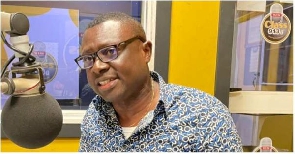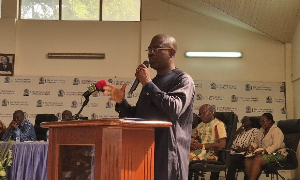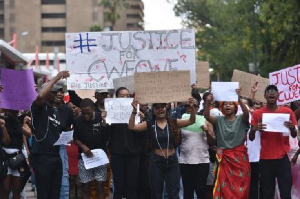Prof Enoch Opoku Antwi has reacted to the alarming popularity of examination malpractice in Ghana’s education sector, especially in first and second cycle institutions.
Associate Dean of Business Administration and Communication Arts, Academic City, Accra, he, firstly, laid the paramount blame on the West African Examination Council (WAEC), argued their monopoly is a breeding bed for corruption and secondly chided parents and guardians who encourage their wards to cheat.
He also warned students against seeking shortcuts to success, in school, and generally in life, noting that the habit is ultimately counterproductive.
Prof Enoch Opoku Antwi spoke to Class News’ Prince Benjamin (PB) in an exclusive interview on the sidelines of the maiden George Ayittey Memorial Awards (GAMAs) 2023, organised by the Africa Centre for Entrepreneurship and Youth Empowerment (ACEYE).
“Most people have learned about the shortcuts to success in life, and right from politics to the grassroots that’s what’s happening here,” he bemoaned.
He asserted that there is no shortcut to success, admonishing: “That’s not how the world works.”
He recalled his time as a Pearson Manager when his purview was “over 250 state board testing and textbooks in the US,” contending if ever there was an exam leakage, “you don’t blame the board – board of medicine, nursing or engineering – you blame Pearson”.
The board only administers the examination, he said, asserting: “So anytime there’s a leak, blame WAEC.”
Even more, he espoused legal action against the West African Examination Council (WAEC), intimating its failings is undermining hardworking students.
“So all these consistent leaks that happen every year, blame WAEC, and I think people should begin to sue WAEC.
“Because if I sit down to learn and somebody gets a shortcut, pays money and gets the apor [leaked papers] and passes, who should we blame?” Prof Antwi quizzed rhetorically, adding: “It is the administrator of those questions that we should blame, and all the blame should go to the doorsteps of WAEC.”
Prof Enoch Opoku Antwi further argued that “monopoly” is at the root of “this problem”.
“A lot of people have access to WAEC and people can have access to those questions, so why don’t you have another board that will set exams for these students, and then we see which one is more competent, and then people will have more options,” he proposed.
In which case, he added, “when WAEC’s name is dragged in the mud because of cheating, we’d use the other alternative and if they can secure our questionnaires, and people who work hard can pass correctly, then why not use them and dump WAEC? But the monopoly of WAEC is causing the problem of this cheating system in our education.”
Turning his attention away from WAEC, he rebuked recalcitrant students and “parents as well”.
“Those who are getting these questions, their parents give them money to pay [for said papers],” he said.
He cited an instance where a child “was furious with the mother because everybody was paying to get this apor,” but his mother would not oblige.
“If there’s a shortcut to pass, then why sit down to learn to pass? Why buy a book when you can borrow it?” Prof Opoku Antwi quizzed rhetorically.
He advocated that “parents must be oriented because education has been part of every solution”.
Parents, he said, should be made to understand that “cheating will lead your ward to be a deviant”.
Prof Opoku Antwi cautioned that a child who cheats his way into the university will find it hard to resist similar temptations “to lie on [their] CV to get a job and when [they] get to the job, [they] will cheat to make money to build a house or buy a car”.
“So we should stop the habit right there [at the earliest possible time],” he asserted in conclusion.
General News of Thursday, 30 November 2023
Source: www.ghanaweb.com













